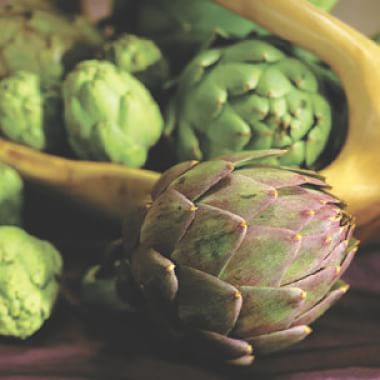
Few vegetables look as forbidding as the artichoke. But for many cooks, this ungainly flower bud, harvested from a plant of the sizable thistle family, is a culinary treasure with a mild, nutty flavor to be savored. Baby artichokes are gaining in popularity and appear on restaurant menus around the country, but most artichoke fanciers relish larger vegetables with more to them to enjoy. Baby artichokes are not immature artichokes but are simply small ones grown lower down on the plant. Whether large, medium or small, all artichokes cultivated for commercial sale are Green Globe artichokes, which can be rounded or cone shaped.
Selecting
The primary artichoke season is in early spring, followed by a second, smaller season in fall-winter. Buy artichokes that are heavy for their size. Look for tightly closed, olive green leaves and moist, healthy stems. A few purple streaks on the leaves are acceptable, but limp, brownish globes should be passed by. Some winter artichokes have black streaking, which indicates slight frost damage and is nothing to worry about. In fact, some artichoke lovers think these later vegetables are preferable to spring ones for their slightly nutty flavor. Baby artichokes should be olive green with tightly closed leaves.
If a recipe calls for artichoke hearts, use fresh ones or buy frozen or water-packed canned hearts, which are readily available in supermarkets. For cooked preparations, avoid small jars of marinated artichokes as they add unwanted oil and flavorings to a recipe. They are, however, good in salads and as part of an antipasto spread.
Storing
Sprinkle artichokes with a few drops of water and store in a perforated plastic bag in the coldest part of the refrigerator for up to 1 week. If cooking them on the day you buy them, leave them at cool room temperature. Once opened, marinated artichoke hearts will keep refrigerated for up to 2 weeks.
Preparing
Use only stainless-steel knives and cookware when preparing artichokes, since carbon steel, aluminum and cast iron will discolor the vegetable within moments of cutting. No matter what you do, artichokes will darken somewhat, but fortunately, this discoloration does not affect their flavor.
Related Recipes:
- Artichoke Soup →
- Artichokes with Bread and Tomato Stuffing →
- Artichoke Hearts in Lemon-Parsley Sauce →
- Artichoke and Leek Frittata →
- Veal and Artichoke Involtini →
- Grilled Artichokes →
- Warm Artichoke and Bread Salad with Marinated Crescenza →
- Pancetta-Stuffed Artichokes →
- Braised Artichokes à la Barigoule →
- Artichoke and Lemon Fritto Misto →











